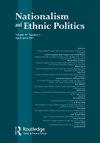“它只会惹恼新教徒”:1991年北爱尔兰人口普查和爱尔兰语
IF 1.1
Q3 ETHNIC STUDIES
引用次数: 0
摘要
摘要:本文利用档案资料,重建了1991年北爱尔兰人口普查中增加爱尔兰语问题背后的决策过程。它突出了这个案例的一个显著特征:尽管这样的决定通常是国家与社会相互作用的结果,但这个问题更像是由爱尔兰政府提出的,它利用1985年《盎格鲁-爱尔兰协议》赋予它的角色,充当一个亲族国家,以促进北爱尔兰民族主义者的文化利益。贝尔法斯特的官员最初不愿同意这一要求,尽管他们担心拒绝这一要求可能会导致民族主义者再次抵制以前的人口普查。最终,威尔士和苏格兰的语言问题开创了先例,这使得排除问题很难站得住,官员们不情愿地同意了这个问题,他们把这个先例看作是一个有用的论据,可以用来抵御潜在的联合主义者的反对,他们担心这可能会导致针锋相对的抵制。这个问题的纳入后来对有关北爱尔兰爱尔兰语地位的政治主张产生了重大影响。本文章由计算机程序翻译,如有差异,请以英文原文为准。
“It Will Do No More than Annoy the Protestants”: The 1991 Northern Ireland Census and the Irish Language
Abstract Making use of archival sources, this article reconstructs the decision-making process behind the addition of an Irish language question to the 1991 Northern Ireland census. It highlights a distinctive feature of the case: whereas such decisions usually result from state-society interactions, the question was rather suggested by the Irish government, using the role granted to it by the 1985 Anglo-Irish Agreement to act as a kin state to promote the cultural interests of nationalists in Northern Ireland. Officials in Belfast were initially reluctant to accede to this request, though feared refusal might result in a repeat of nationalist boycotts of previous censuses. Ultimately, the precedent set by language questions employed in Wales and Scotland made exclusion hard to justify and officials reluctantly agreed to the question, coming to see the precedent as a useful argument with which to fend off potential unionist opposition, which they feared might have resulted in a rival boycott. The inclusion of the question has subsequently had significant consequences for political claims-making about the status of the Irish language in Northern Ireland.
求助全文
通过发布文献求助,成功后即可免费获取论文全文。
去求助
来源期刊

Nationalism and Ethnic Politics
ETHNIC STUDIES-
CiteScore
1.30
自引率
0.00%
发文量
30
期刊介绍:
Nationalism & Ethnic Politics explores the varied political aspects of nationalism and ethnicity in order to develop more constructive inter-group relations. The journal publishes case studies and comparative and theoretical analyses. It deals with pluralism, ethno-nationalism, irredentism, separatism, and related phenomena, and examines processes and theories of ethnic identity formation, mobilization, conflict and accommodation in the context of political development and "nation-building". The journal compares and contrasts state and community claims, and deal with such factors as citizenship, race, religion, economic development, immigration, language, and the international environment.
 求助内容:
求助内容: 应助结果提醒方式:
应助结果提醒方式:


